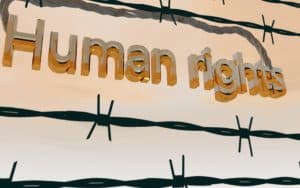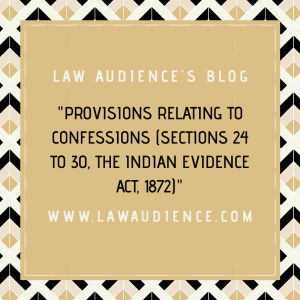THE RIGHT TO PRIVACY IS A FUNDAMENTAL RIGHT[1].
INTRODUCTION:
“Your secret ain’t a secret anymore, it’s my business”, this is the real status of privacy in our Country. It is sad that all this time our secret was never kept a secret, but was subjected to profiling by both the State and Private bodies. For the past 60 years the right to privacy was never considered a fundamental right but with the advent of Justice K.S. Puttaswamy’s Judgment, it was held that “The right to privacy is protected as an intrinsic part of the right to life and personal liberty Under Article 21 and as a part of the freedoms guaranteed by Part III of the Constitution.”[2] Now, privacy is considered as one among the fundamental rights. Unlike most of the fundamental rights, the right to privacy is not an absolute right.
The two cases which held that the “Right to privacy is not a fundamental right” were:
- P.Sharma v. Satish Chandra (1954)[3]:
The Hon’ble Supreme Court bench which decided this case consisted of eight judges. The facts of the case are:
“The shareholders were found guilty of malpractice in accounting by showing forged balance sheets. Hence, Search and Seizure was conducted in the Dalmia Jain Airways Ltd. The petitioners claimed that their right to privacy was violated. Since the right to privacy was such a new concept at that time the Court didn’t emphasize much on it and held that the Right to Privacy is not a Fundamental Right”.
- Kharak Singh v. State of Uttar Pradesh ( 1962)[4]:
In this case, the Supreme Court bench consisted of six judges.
“The petitioner accused the police of UP for infringing his right to privacy by means of surveillance. The provisions of UP police regulations allowed domiciliary visits at night, secret picketing, tracking and verifying Kharak Singh’s movements. Justice Subbarao held that domiciliary visits were unconstitutional but the right to privacy is not a Fundamental right”.
Though the smaller benches held that Right to Privacy is a Fundamental right, it wasn’t applicable as the Apex court held a different opinion.
Justice K.S. Puttaswamy challenged the constitutionality of Aadhaar. In this judgment, the nine-bench judge reversed the judgment of M.P.Sharma’s case and Kharak Singh’s case. They overruled the judgment of the two cases. They held that Right to privacy is a fundamental right. The word “Life” in Article 21 means a life of dignity and not just an animal life. With this principle, the purview of Art.21 was extended.
Since the Right to Privacy is linked to Art.21, the judges framed the guidelines to test the infringement of the right to privacy.
- The Action must be sanctioned by law. If there arises a situation where the privacy of a person is to be infringed, the action and the reason for which the action is commissioned is to be legit. For e.g.: To analyze whether the possibility of the spread of venereal disease is more in homosexual or heterosexual couples.
- The proposed action is to be necessary for a democratic society to achieve the legitimate aim. It is necessary that the proposed action should have application in our society. For e.g.: The research is done in order to prevent the spread of venereal diseases.
- The extent of such interference is to be proportionate to the need for such interference. It is to be noted that the reason for committing such an act should be justifiable and it should result in achieving the final aim. For e.g.: The collection of sensitive data is to find out whether the possibility of the spread of venereal disease is more in homosexual or heterosexual couples.
- There must be procedural guarantees against abuse of such interference.[5] The authorities whosoever collects such information should undertake the responsibility to ensure whether such collected information will be secured. For e.g.: the information regarding the sexual orientation of the individual is collected and it should be made sure that the obtained information is secured properly.
RESTRICTION TO THE RIGHT OF PRIVACY:
- Mustn’t violate the other rights:
The right to privacy is not supposed to infringe upon the rights of other individuals.
- National Security Interest:
Sometimes the privacy of citizens is compromised in issues concerning with national security.
- Public Interest, Scientific historic research:
In matters concerning public interest and research etc., the privacy of individuals doesn’t stand a chance against the welfare of the state.
- Criminal Offences:
Storing data about criminal records of an individual helps to track down the repeated offender and it also helps in tracking down the offender with fewer evidences also.
- Tax :
Sharing financial details helps in the assessment of the amount of tax to be paid by an individual.
IMPACTS OF THE PRIVACY VERDICT:
AADHAAR:
This verdict made it non- mandatory for linking the aadhaar with other services. The database would be one of the largest in the world with bio-metric details (fingerprints, iris scan) of 1.25 billion registered Indians. The real challenge would be in devising the limitations of the application of aadhar and the security to be enforced to protect the data obtained.
PRIVACY AGAINST PRIVATE PLAYERS:
Applicability of the right to privacy on the private players is another matter of concern. Uber is one of the largest cab service providers. Though it is free, how did it gain such a huge market share? It is because Uber tracks each and every move of yours on a daily basis. Thus, it processes our data and creates a profile and sells it to other parties. The other parties utilize our data and enhance their marketing techniques so that they can boost their profits. Similarly, Facebook and Whatsapp utilize the same techniques and share your data too. Thus, it is to be made sure that the right to privacy is applicable to foreign players also.
SECTION 377:
It is to be also noted that this judgment formed the basic foundation for the decriminalization of consensual sex among the LGBTQ community. In the attempt to define privacy the Supreme Court held that the “Sexual orientation is an essential attribute to privacy”. Thus, this further led to the scrapping down of Section 377.
RIGHT TO INFORMATION:
The individuals are given the privilege to withhold any specific information or control the type of information that has to be shared. Hence, it infringes the other person’s right to information. It curtails the privilege granted by the right.
Though, the boundaries for the right to privacy are to be established. The court observed that the purview of privacy would expand on the basis of the case after case. The real challenge arises when the principle laid down in this judgment is applied in subsequent cases. Thus, in the age of technology, it is highly necessary to give recognition to the protection of data and granting the right to privacy.
[1] Authored By: Ms. Rishitha.K, B.B.A.LL.B, 3rd Year Student at IFIM Law College & Research Writer at Law Audience: Edited By: Mr. Varun Kumar (Founder & CEO & Editor-In-Chief).
[2] Justice K.S. Puttaswamy and Ors. v. Union of India (UOI) and Ors. (24.08.2017 – S.C.): MANU/S.C./1044/2017 (India).
[3] M.P. Sharma and Ors. v. Satish Chandra and Ors. (15.03.1954 – S.C.) : MANU/S.C./0018/1954 (India).
[4] Kharak Singh v. The State of U.P. and Ors. (18.12.1962 – S.C.): MANU/S.C./0085/1962 (India).
[5] supra note 2.



